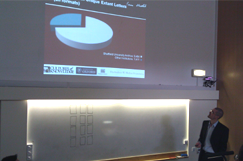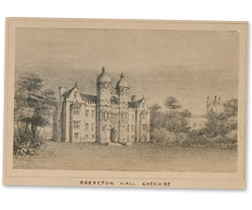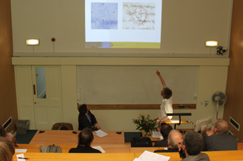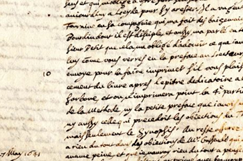Seminar 6: How Large was Hartlib’s Archive?
Tags: Archives, Loss, Samuel Hartlib, Union Catalogue

Dr Penman during his talk.
 For the sixth paper of our seminar series on Thursday 9 June, our very own Dr Leigh Penman (University of Oxford) shared some of his most interesting Project findings in a talk entitled ‘How Large was Hartlib’s Archive? A Quantiative Analysis and Comparative Reassessment’. In a richly illustrated and wide-ranging analysis, Penman provided both startling new quantitative insights into the original scope of Hartlib’s correspondence, and a rich narrative explanation of why his epistolary corpus has descended to us in such partial form. In the first half of the paper, Penman described the dimensions and attributes of the extant archive, most of which survives among the holdings of Sheffield University Library (and was previously digitized by the Hartlib Papers Project). He also introduced some brand new Hartlib letters he has located in other international repositories, and used the following algorithm, developed in partnership with a theoretical physicist, to estimate the total extent of the original archive:
For the sixth paper of our seminar series on Thursday 9 June, our very own Dr Leigh Penman (University of Oxford) shared some of his most interesting Project findings in a talk entitled ‘How Large was Hartlib’s Archive? A Quantiative Analysis and Comparative Reassessment’. In a richly illustrated and wide-ranging analysis, Penman provided both startling new quantitative insights into the original scope of Hartlib’s correspondence, and a rich narrative explanation of why his epistolary corpus has descended to us in such partial form. In the first half of the paper, Penman described the dimensions and attributes of the extant archive, most of which survives among the holdings of Sheffield University Library (and was previously digitized by the Hartlib Papers Project). He also introduced some brand new Hartlib letters he has located in other international repositories, and used the following algorithm, developed in partnership with a theoretical physicist, to estimate the total extent of the original archive:
L = S(x/y)
The equation multiplies the sample size (S) by references in the sample to letters no longer extant (x) divided by references in the sample to surviving letters (y) to arrive at the averaged estimate of total correspondence (L); in Hartlib’s case, a grand total of 11,508 letters, a figure large enough to catapult him into the first rank of European intelligencers such as Peiresc, Boulliau, and Leibniz. In the second half of the paper, Penman speculated on why only around 42% of this original corpus has descended to us. In a painstaking reconstruction of the archive’s passage through space and time – and through different ‘microsociologies’, in Penman’s memorable phrase – he described the steady attrition of Hartlib’s papers through thefts and fires while he was still alive; the sale and scattering of papers by his two sons following his death; and the relocation of the papers to Brereton Hall (pictured) in Cheshire around 1664, where they fell prey to the systematic manipulations of John Worthington, William Brereton, and others. He also discussed further archival tampering in the nineteenth century, evidence for which is liberally scattered throughout the papers (for example in the wrappers of the surviving ‘bundles’), as well as in several long-overlooked scholarly articles. Questions focused on the nature of the mathematical calculations; the grey areas between correspondence and other varieties of document in Hartlib’s notoriously difficult archive; the importance of autograph collections and auction catalogues as sources for the reconstruction of nineteenth-century archives; and the curious lack of interest in Hartlib’s work and legacy on the part of early members of the Royal Society. Seminars take place in the Faculty of History on George Street on Thursdays at 3pm. For future talks in the series, please see the seminar webpage.
Podcast now available on the seminar page!




 Join
Join 